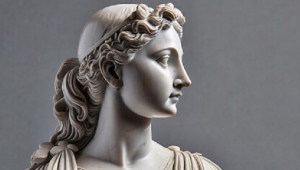WORLD MYTHOLOGIES: Classical Conceptions & Modern Manifestations
ENG 2070 Spring 2025 Leon Lewis
Office: 244 Sanford T Tr 11:00-12:00, and arranged as needed
lewislh@appstate.edu (828) 262-2329
Pallas Athene – Daughter of Zeus (via parthenogenesis) – Goddess of WISDOM…and WAR (contradiction?)
This is a reproduction from the Roman era after the original statue, attributed to Phidias, circa mid-century 500 BCE. was lost to the records of human history
Travel through Space/Time on a journey of exploration as origins, deities, epic “hero figures,” legendary lands and emerging social constructions - from the earliest stirring of tribal groups to the formation of the polis, and onward to the post-modern world - are revealed in the literature, film and oral expressions of creative artists throughout human history.
GOAL To establish the fundamental foundations of the belief systems of some of the more prominent cultural communities of the planet from the era of the Pleistocene through the Holocene to the Anthropocene (terminology subject to some debate). In consort with this aim, the course is designed to:
Enable students to use textual evidence to support and illustrate a position
Develop techniques of critical thinking in order to act in accordance with the obligations of a citizen of a democratic republic
Refine and enhance the ability to write with clarity, style and organizational ability in response to the predominant themes of the course
PROCEDURES OF INSTRUCTION:
CONVERSATION – Pursuant to primary themes and subjects
PRESENTATION – Collaboration as a part of a group
EXPLORATION AND INVESTIGATION - Research and scholarship on an individual basis
UNITARY DIVISIONS (with permeable dividers)
ORIGINS -The Creation
The National Epic
DEITIES -
HEROIC FIGURES – {with cinematic correlatives to be explored}
The Journey and The Quest
AUTHORSHIP AND AUTHORITY - Who writes the story?
GENDER: [Re]Vision and [Re]Formation
_______________________________________________________________________
FABULOUS BEASTS – (Species correlations)
Animals and/as Humans
ENVIRONMENTAL AFFECTS –
Geologic and Meteorological Constraints and Advantages
EVALUATION
For purposes of evaluation, students will be asked to write two essays in response to the major matters of the course. The specific details, approaches, methods and subject matter for each assignment will be discussed prior to the dates when the assignment is submitted. The first essay will be due at the midpoint of the semester, and the second as a Final Written Assignment (in lieu of a “Final Exam”).
Forums: To continue the conversation beyond the class room; a record of individual participation and an active demonstration of student engagement with the course materials. The Forums will not be graded, but will provide a record of responsibility, and will be taken into account in the determination of the course grade.
Group Presentations: a record of activity as a part of a group pursuing a particular element of the course selected by the individual members
Rental Text: The World of Myth, David Adams Leeming, Oxford University Press, 1990; to be ordered from the bookstore as an Ebook. To place order - go to the class AsULearn site; click on Read Now: go to VitalSource Bookshelf Student Support Page; locate and order text.
ATTENDANCE POLICY:
As the Undergraduate Bulletin states:
Students are expected to attend every meeting of their classes, and are responsible for class attendance. No matter what bases exist for absence, students are held accountable for course activities.
More than six absences during the semester would raise some questions about student engagement, but an explanation of the “reasons for absence” will always be respected (and expected).
The AI Component:
The evolving, unpredictable nature of the AI instrument is being addressed by universities (and many enterprises) throughout the world. ASU has been proactive in its development of guidelines and practical principles designed for the utilization of what may be both an opportunity to enhance learning, and an area where misuse my result in “uncited or improperly cited use of work” occurring with an application of “generative AI programs.” This is an area that is undergoing continuous evolution, which means that as the semester progresses, any previous assumptions may have to be modified.
As the ASU Task Force states: “The continuously evolving nature AI defies any hard and fast rules for governance.” As an example of a “value-based academic integrity approach to AI,” the Task Forces cites a statement from a Texas A & M University Center for Teaching Excellence:
Using an AI-content generator (such as Chat GPT) to complete course work without proper attribution or authorization is a form of academic dishonesty.” The ASU Writing Center, under the heading of “Permissible Policies,” advises an inclusion similar to “I have no objection to the use of these technologies in your writing as long as they are not used to substitute for your own ideas or drafting process.”
It is apparent that this isa very complex issue, and I am hoping that a reasonable and sensible approach to an instrument of immense potential will result in a positive outcome for this class.
English 2070 is conducted in coordination with the University Academic code, which states:
As a community of learners, we must create an atmosphere of honesty, fairness and responsibility, without which we cannot earn the trust and respect of each other. Furthermore, we recognize that academic dishonesty detracts from the value of an Appalachian degree. Therefore, we shall not tolerate lying, cheating, or stealing in any form and will oppose any instances of academic dishonesty. This course will follow the provisions of the Academic Integrity Code, which can be found on the office of Student Conduct Web site: www.studentconduct.appsstate.edu.
This course will cooperate fully with the University Policy with respect to accommodations for students with disabilities, and other individual needs. See www.eds.appstate.edu for a full explanation of related matters, including religious observances, emergency absences, and other matters pertinent to the integrity of our mission as members of the ASU community.

